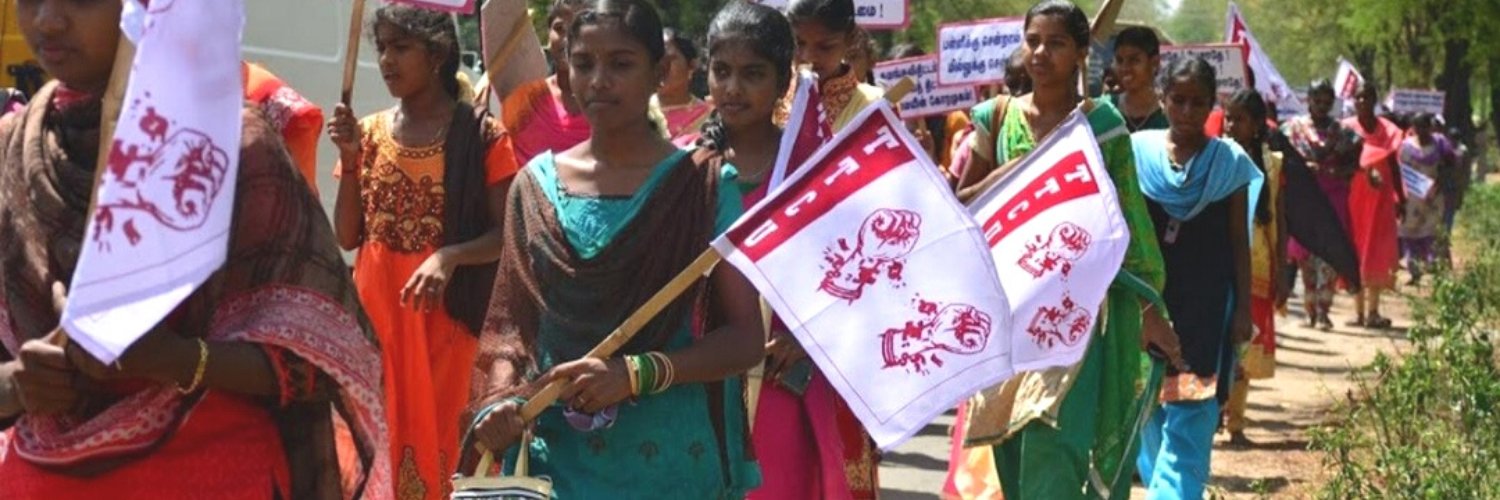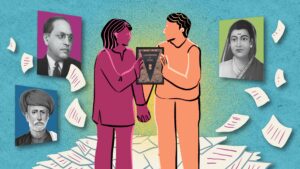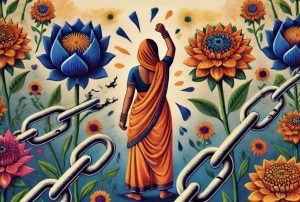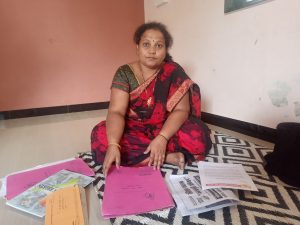A Dalit Women’s Union Wrests a First-Ever Private Pact Ensuring Gender Safety At Work

After a year-long campaign by a Dalit women’s union in Tamil Nadu, the multinational fast-fashion brand H&M and its Tamil Nadu-based supplier, Eastman Exports Global Clothing Private Ltd, have signed a legally binding agreement to protect the latter’s predominantly female workforce from violence and harassment at work. It is the first-ever such private workplace initiative on gender violence in India, and also Asia.
The agreement comes after the union, the Tamil Nadu Textile and Common Labour Union (TTCU), fought to fix responsibility for the events that led to the January 2021 murder of Jeyasre Kathiravel, 20, a Dalit textile worker at Natchi Apparels, one of Eastman’s units in Dindigul in southern Tamil Nadu. She was allegedly raped and murdered by her factory supervisor, Thangadurai, who had reportedly been harassing her for months before the murder. He has reportedly confessed to the crime and is awaiting trial.
The other signatories to the H&M/Eastman agreement were the TTCU, the Asia Floor Wage Alliance (AFWA), an Asian labour and social alliance, and the Global Labor Justice-International Labor Rights Forum (GLJ-ILRF), a strategy hub. These labour bodies backed the campaign and ensured global attention for the issue.
There have been multiple reports (see here, here and here) on the harassment of women workers in India’s textile and apparel sector and the demands for intervention. Women constitute upto 60% of the sector’s workforce but the lack of gender and caste diversity at the managerial level prevents their voices from being heard, say labour activists and workers.
For instance, an independent investigation by the TCCU into sexual harassment at the Dindigul unit found that there had been no response when at least 25 workers had complained to their supervisors. A culture of impunity prevailed at the factory unit, the report said.
The agreement is also significant because it is the second such to hold an international fashion brand liable for worker safety at its Asian textile units. (The first was the Accord on Fire and Building Safety in Bangladesh, signed after the 2013 industrial disaster at Rana Plaza in Dhaka that killed 1,132 workers and left at least 2,500 injured. Signed by over 190 brands, it covers more than 2 million workers across the country’s over 1,600 garment and textile factories.)
The pact is unique in that it lies at the intersection of gender-based violence and harassment, caste oppression and workers’ freedom to form associations with unions. “It has been made structurally difficult for Dalit women workers to access legal resources,” said human and labour rights lawyer Maitreyi Krishnan. “The risk in taking recourse to legal measures or resources is pretty high since these contractual workers are deprived of job security. Historically, Dalit workers have been placed in extremely vulnerable working conditions to prevent them from speaking out against exploitation,” she said.
Behanbox could not view the agreement in its entirety as it was signed on the condition of non-disclosure.
Redefining workplace
During the ICC investigation into Kathiravel’s death, the factory had shrugged off its responsibility towards workers by claiming that her body had been found on a farm, miles from the factory and that the crime was committed outside working hours, Thivya Rakini, TTCU’s president, told Behanbox in a telephonic interview.
To rectify this, the H&M-Eastman agreement draws on the definition of gender-based violence laid down at C190, the International Labour Organization’s 2019 Convention on Violence and Harassment. The term “workplace”, it said,includes “public and private spaces where they are a place of work; in places where the worker is paid, takes a rest break or a meal, or uses sanitary, washing and changing facilities; during work-related trips, travel, training, events or social activities; through work-related communications, including those enabled by information and communication technologies; in employer-provided accommodation; and when commuting to and from work”.
As part of the agreement, all workers, supervisors, management executives, and Internal Complaints Committee (ICC) members will have to undergo gender sensitisation trainings based on AFWA’s Safe Circle model, which seeks to drive behavioural changes in production lines using case studies featuring “potential victims, perpetrators and by-standers”.
The TTCU will be entrusted with electing and training shop-floor monitors who will ensure that fellow women workers do not face sexual harassment and intimidation, and to who workers can report harassment. These monitors will then elevate the complaints to the management and the ICC while ensuring complete confidentiality of the survivor’s identity.
The agreement also calls for a reconstitution of the ICC at the Natchi Apparels because it has failed to address the grievances of the workers, according to the TTCU. In addition, an independent panel will be put in place. “If people are not happy with the ICC, such a panel will ensure another level of independent investigation,” explained Nandita Shivakumar, campaigns and communications coordinator, AFWA.
An employee violating rules of behaviour can be terminated or at least suspended from work. The suppliers’ profits are tied to their compliance with the terms and conditions of the agreement. “This means that in case of non-compliance or violation, the supplier will lose orders,” said Shivakumar.
60% female workers are Dalits
“Had Jeyasre belonged to another caste, he would not have dared to touch her,” said Rakini on how Kathiravel’s Dalit identity left her vulnerable. “They know that Dalit women are voiceless and relegated to the margins of the society, so they take advantage of that fact and harass them. The management is upper caste, while Dalit workers’ families do scavenging or other kinds of sanitation work.”
The state’s garment industry depends heavily on Dalit women’s labour, data show. “From the 1990s onwards the male, unionised workforce of the mills has been replaced by young female workers, who are more compliant than adult males. 80% of the women workers are younger than 18 years of age and 60% come from a Dalit background,” said a 2016 report of the India Committee of the Netherlands (ICN), a human rights advocacy, on the workforce in the state’s spinning mills. Female workers are preferred over male workers in the industry because they are less likely to unionise, found the report.
“In most Asian countries, the (garment) industry has developed around a model based on low-cost, low-skilled female labour for markets mainly in the United States of America, Europe and Japan,” as per a 2021 ILO report on the work conditions in Asia’s garment sector.
Consider the gender skew on shop floors – upto 90% of the garment workers at the Natchi Apparels factory are women whereas more than 90% of the supervisors are men, according to the fact finding report prepared by AFWA and TTCU.
The maintenance of caste and gender hierarchies benefits the brands, alleged Shivakumar. “In the garment industry, especially in the Natchi unit, women workers are Dalits and supervisors belong to dominant castes. When a brand demands the production of large orders in very little time, they use existing structures of patriarchy and caste oppression to get it done and extract profits,” she added.
For a just work environment, it is critical to have caste and gender diversity across an organisation’s hierarchy, stressed Poongodi, a garment worker who is also the treasurer at TTCU. “Among us are many capable Dalit workers who can easily fulfill managerial roles at the factory. If there is more representation of Dalits and women, our complaints will not go unheard,” she said.
Failure of the ICC
Each workplace is required to constitute an ICC under the Sexual Harassment of Women at Workplace (Prevention, Prohibition and Redressal) Act, 2013, or POSH, to investigate complaints of sexual harassment and take action as mandated by the law.
Despite this, many workers who had faced harassment at work did not know who to approach, said Rakini. They also feared retaliation for reporting harassment.
Women workers at Natchi Apparels said they had lost faith in the ICC because even after they complained they saw no change in supervisors’ attitudes at work, said the TTCU-AFWA report.
“Some workers observed that those who complained to the ICC were demoted, fired from their jobs, or became [sic] targeted within the factory through increased production targets or other forms of violence. Other workers commented that they do not know how the ICC works and who the members of the ICC committee are. Thus, workers find no incentive in registering a complaint with the ICC,” the report stated.
If the ICC fails to act in accordance with the law, an appeal can be filed against the order of the committee in the court under POSH, explained lawyer Krishnan. Under section 26 of the Act, a fine of upto Rs 50,000 can levied on an employer who contravenes or fails to comply with the act’s provisions, does not constitute an ICC or take some action.
The Kathiravel family has alleged that the supplier intimidated them into signing documents that absolved the latter of any responsibility for the crime and insisted that they accept a small compensation.
Unions mostly dominated by men
“We launched the #JusticeForJeyasre campaign at a critical point. Despite repeated complaints, no action was being taken. We felt it was imperative to demand justice,” said union president Rakini.
The TTCU campaign had three demands – fair compensation for the Kathiravel family, an immediate end to any retaliation or coercion related to the case and an enforceable agreement guaranteeing workers the right to unionise and seek an end to gender violence.
“We have spent sleepless nights in the last 14-15 months to raise awareness about the incident among international groups through virtual meetings. With the help of AFWA and GLJ-ILRF, we were able to garner support from 97 trade unions and labour groups across the globe. This victory is significant for us,” said Rakini.
An important aspect of the agreement is that it guarantees the workers the freedom to associate with unions, said AFWA’s Shivakumar. “A major problem that we noticed was the lack of factory-level unions in the garment industry in Tamil Nadu. We have seen that a collective voice in the form of women-led unions is fundamental to combating gender-based violence. Without unions none of the issues of the women workers can be addressed,” she said.
Since trade unions have been largely dominated by men, industrial associations are reluctant to recognise those led by women, Rakini told Behanbox. “We have faced this issue since our inception in 2013 and until recently. The gender-based issues of women workers extend beyond their workplace. And most trade unions, led by men, are incapable of fully addressing or taking these issues up with the factory management until they are aware of it themselves. Women-led trade unions can do this better,” she said.
We believe everyone deserves equal access to accurate news. Support from our readers enables us to keep our journalism open and free for everyone, all over the world.




